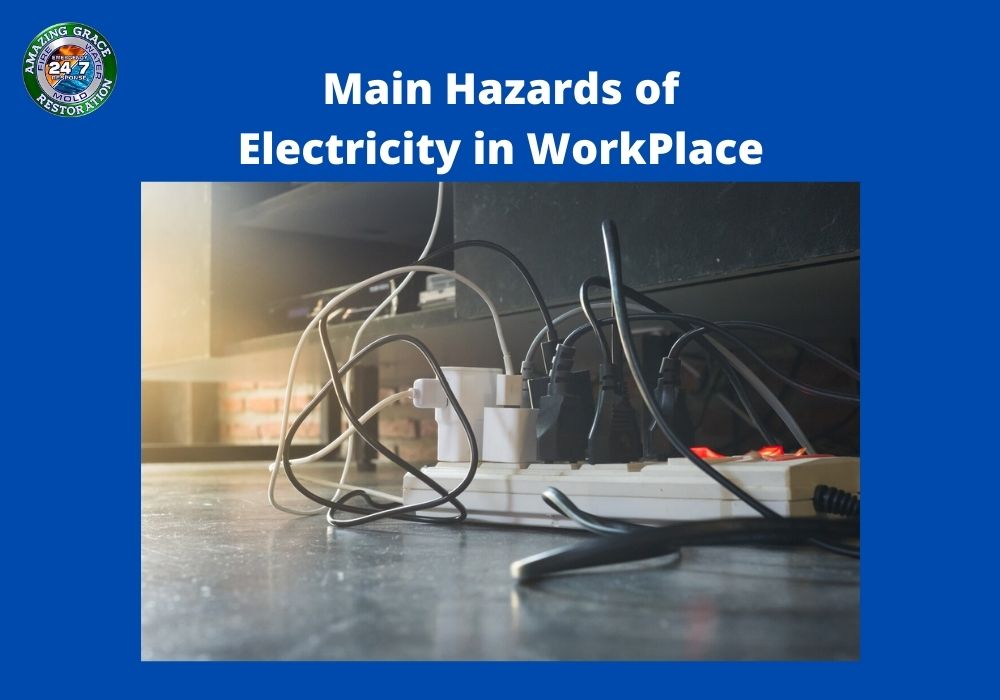230-volt power has normally supplied at the places of work when there is a single-phase but for 3 phase 400 volt power is supplied. Even though few bigger workplaces will get electricity at a higher supply voltage. The common risks with electricity are:
Exposure to live parts causing burns and shock
Faults which could be the reason for fires
An explosion where electricity could be the source of disturbance in a potentially burnable atmosphere which is explosive for example in a spray paint booth. There is a great risk of an electrical fire in wet or damp places. You can contact technicians in Conway in case of any problem they will properly guide you.
Faulty or Defected Wiring
Faulty or damaged wiring can be the main electrical hazard at your workplace. Separate the non-functioning wires at once. Wires that are crumpy, loose, or have a fault in them should be checked or replaced. Faulty wires can be the main reason for electrical fires and shocks. You should aware of faulty and damaged wires and take necessary precautions.
Overloading Circuits
The current in the wires will heat the cables to a very high temperature if multiple tools are plugged into the circuit, which can be the main reason for the explosion or fire. Arcing is probably generated if the wire insulation melts and causes an explosion in the place where the overload exists or even it can cause a fire inside a wall.
Use of Extension Cords
Extension cords tend to produce cracks and many other faults that can lead to shock. With electrical tape, these issues cannot be covered. It is good to place your electrical tools within reach of an electrical outlet instead you use an extension cord. It is better to be safe and do what is best for you.
Improper Grounding
To get a low resistance path for excess current into the earth every electrical tool, and device must be grounded. Ground defect current directly has an effect on human safety and can be the reason for electrical shock and fires. Moreover, the ungrounded electrical system can be dangerous to your electronics. This necessary safety quality takes alit of electricity away from your equipment, which can protect your electronics from damage.
Loose Fitting Plugs
The stopper for all electrical tools should be strongly fitted in its socket. Be careful that loose-fitting stoppers can potentially cause the device to overheat and seize fire. It probably needs periodic physical tests to make sure that the stopper has not loosened. Be careful when cleaning of workplace takes place and the device is moved during cleaning, causing the plug to get loosen from the socket.
Water Spill on Electrical Tools
No electrical tool should be worked or even switched in case of contact with water. Water highly increases the danger of electrocution particularly if the device has faulted insulation. Turn off the connection of the main power, then unplug all the wet devices. Ensure you dry them out properly. Have an expert technician test the tool to confirm it is no longer a risk and can be switched back on.
What do You Have To Do?
You must make sure an evaluation has been made of any electrical risk, which covers
How the level of danger has been settled.
The safety that taken to control that risk
Who could be harmed by them
You should take into consideration the kind of electrical tool used, the way in which the equipment is used, and also be careful about the environment that which it is used. The unsuitable tools can become live and also it will make the surroundings live too in wet surroundings.
Circuit-breaker, fuses, and many other devices must be accurately rated for the circuit they defend. If possible keep isolators and fuse boxes locked. Cables, sockets, plugs, and fittings must be strong enough and appropriately secured for the working environment. Make sure that the apparatus has a reachable switch to cut off the power speedily in an emergency. You can contact experts in Conway in case of any emergency.
Execute Preventive Maintenance
To stop danger all electrical tools and installations should be maintained. There should be the best system of visual checking where it is necessary. Most electrical hazards can be controlled by concentrating on a simple, low-cost system of searching for visible marks of damage or fault. It is suggested that fixed installations are checked regularly by a qualified person. The frequency of any compulsory testing and inspections will depend on the kind of machinery, how frequently it is used, and also depend on the environment in which it is used.
By reporting any damage or fault they discover, users can help. Make sure that people who are working with electricity are capable to do the job. Even simple duties like wiring a plug can lead to risk. Make sure that people know what they are doing before they begin the work. You can contact the best technician in Conway in case of any emergency.

